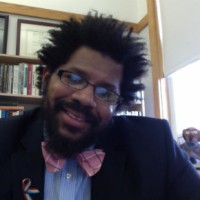Black atheists and the black church
As African Americans faced first slavery and then Jim Crow, they nestled in the black church as a haven. In the 1950s and ’60s, blacks congregated to fight legal oppression. In The Color of Christ, American religion historians Edward Blum and Paul Harvey argue that blacks and whites were once unified under the mantle of Christianity in efforts to combat societal vice and ills. Yet in more recent decades, black religiosity has shifted.
Though many within the black community continue to showcase their religious conservatism, others have slowly drifted away. And not just from the black church—but from religion in general. With black educational attainment and hence the rise of the black middle class, more and more black people are asking, Do I believe in God? Can I afford to believe in God? Such doubt has allowed for the growth of support groups such as Black Nonbelievers, Inc., whose president wrote “Confessions of a Black Atheist,” published earlier this year by CNN. Mandisa Thomas discussed how she has “had to endure ostracism from family and friends as a result of openly identifying as an atheist.”
For many black Americans who have reached middle class status, the bourgeois life opened up a secular window. It has long been acceptable for white Americans to be drawn to a material world not confined by the beliefs of Western religious culture. Now Thomas and others in her generation are permitted to step back from the civil rights era and the narrative of Martin Luther King Jr. She and other black nonbelievers have no need for God and religion as they express grievances as part of movements such as Black Lives Matter.
Still, for many black people, to admit being agnostic or atheist is a ticket towards exile. An atheist within the black community can be seen as criminal. Black folks have long used religion as a way to find answers for their historical suffering within white America. And though there are black Christians who live a life of moral contradictions with scripture, few would allow a place for being a nonbeliever.
Eddie Glaude, in his post “The Black Church is Dead,” aims to promote conversations about faith and the church among a generation of blacks who have drifted from traditional religion. He notes that roughly 79 percent of blacks believe religion is still an important part of their life. Yet the dynamics of the black church are changing:
The idea of a black church standing at the center of all that takes place in a community has long since passed away. Instead, different areas of black life have become more distinct and specialized—flourishing outside of the bounds and gaze of black churches. I am not suggesting that black communities have become wholly secular; just that black religious institutions and beliefs stand alongside a number of other vibrant non-religious institutions and beliefs.
The religious academic type sees the church as a vehicle to bring about social justice through eradicating poverty, racism, and social ills that permeate society, which was once the drive behind the civil rights movement. Yet there is a division between that type and those who see pure spiritual devotion in the church. And though many blacks continue to galvanize behind the Protestant faith of their forebears, others see it as from a disillusioned past and seek out other avenues to rally for change and social justice. Thus a growing number of blacks no longer feel a need for organized religion and the church.
Our weekly feature Then and Now harnesses the expertise of American religious historians who care about the cities of God and the cities of humans. It's published in partnership with the Kripke Center of Creighton University and edited by Edward Carson, Beth Shalom Hessel, and John D. Wilsey.






